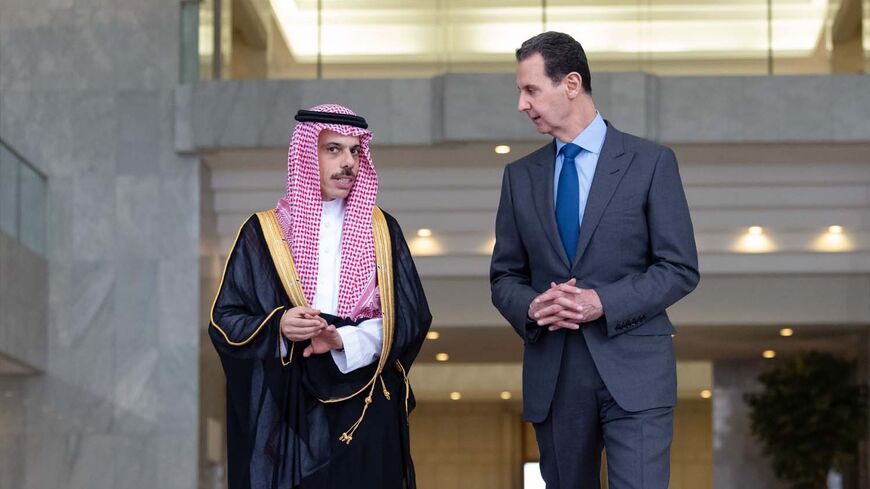Saudi Arabia’s thaw with Syria comes amid talk of the Saudis’ hopes to invite Syrian President Bashar al-Assad to the Arab League summit on May 19 — a move that would end the country’s regional estrangement.
It remains uncertain if Assad will get the invite to the summit in Saudi Arabia, or if the thaw will be confined for now to the bilateral relations between Damascus and different regional countries.
Riyadh’s efforts to warm up to Damascus, marked by Saudi Foreign Minister Prince Faisal bin Farhan's visit to Damascus this month, are a shift for the powerful Gulf state, which was formerly one of the principal sponsors of opposition groups in the Syrian uprising and had adamantly called for Assad to be ousted from power.
Last month, Saudi Arabia reportedly decided to resume consular affairs at its embassy in Syria, shifting normalization into high gear. The decision came on the heels of the landmark agreement between Saudi Arabia and Iran, formerly Riyadh’s nemesis that has embedded itself in Syria.
Steven Heydemann, senior nonresident fellow at the Brookings Institution’s Center for Middle East Policy, told Al-Monitor that the current status quo had become unsustainable. “There is a sense of a kind of new regional political order that is beginning to take shape, in which it has become increasingly untenable for countries in the area to continue to exclude Syria,” he said.
A Syrian return to the 22-member Arab League would further bolster Assad’s image and provide the regional diplomatic cover for countries to move closer to the regime, Heydemann explained, especially those that have held back from normalization.
However, Syria’s return to the league would still be limited to diplomacy, unlikely to provoke significant on-the-ground change, he added.
In the absence of a political solution to the Syrian crisis, sanctions on the regime will likely remain and continue to obstruct Assad’s attempts to renew regional economic ties. And with the entrenchment of international powers in the country, the Arab League will have little leverage in moving the conflict toward a resolution.
Jordanian political science professor and geopolitical expert Amer Sabaileh opined that the Syria issue has become an international one and is “not an Arab issue anymore,” he said.
Saudi Arabia returning to leadership role
The Saudis’ efforts to bring Assad back into the Arab fold come as part of their newfound strategy to win the region over with economic largess: a plan that requires “open doors and zero conflict,” Sabaileh told Al-Monitor.
“The Saudis are showing they are the real decision-makers on Arab affairs,” he said. “They can sell it … 'If you want to see real policies and actions you have to come here.'”
The Wall Street Journal reported in March on deepening rivalry between Saudi Arabia and its former close ally the United Arab Emirates (UAE) over regional leadership. The UAE was the one of the first Arab countries to embrace Assad, including a red-carpet reception for the Syrian first couple last month.
In another Saudi-hosted meeting this month, the Gulf state attempted to sway its hesitant Arab neighbors to accept Syria’s return to the Arab League. However, no consensus was reached.
At least five members of the Arab League are refusing to readmit Damascus, including Morocco, Kuwait, Egypt, Yemen and Qatar, according to The Wall Street Journal. Those states are calling for Assad to first engage with the political opposition in Syria and enact a degree of political reform, along with demands related to their own internal affairs, the Journal reported.
Key among the holdouts is Qatar, which was formerly, besides Saudi Arabia, at the forefront of supporting the rebels against Damascus. But Qatar has not yet followed in the Saudis’ footsteps, noting that only “a change on the ground [in Syria]” plus “an Arab consensus” would change its position.
Political settlement unlikely
Assad’s forces have retaken much of Syria, aside from a Kurdish-controlled pocket in the northeast and rebel-held Idlib province in the northwest, subject to consistent bombardments and sieges by the regime.
Despite pressure from Western countries, Gulf states, Turkey and even the regime’s close confidant Russia over the past decade, Assad has repeatedly refused to open a dialogue with opposition groups in the country or accept any sort of political settlement.
Assad fears a settlement may ultimately lead to his toppling, and his presidency now largely shields him from standing trial for his war crimes, according to Syrian political economist Karam Shaar.
“Because of this, I believe the Assad regime is only willing to give cosmetic concessions,” Shaar told Al-Monitor, such as a national unity government, which would include elements of the opposition.
“But any genuine political reform would indeed result in pushing the regime out of power,” he said. “This is not something they’re [the regime] willing to take the risk of, even years down the road.”
Meanwhile, Saudi Arabia has essentially dropped the idea of a negotiated political reform as a precondition to normalization with Syria. And Syria’s regional neighbors may just be using the calls for a political settlement as a cover to avoid criticism from the West, said Sabaileh. “I don’t think that any Arab country is really interested in asking for serious political reform,” he added.
Sanctions hold, but tested
Without a legitimate political settlement, the outright removal of sanctions on the Assad regime is unlikely, Heydemann said. US- and EU-imposed sanctions, particularly the US Caesar Act, have long impeded Assad’s capacity to sustain economic ties with the region and rebuild after the decade-long war.
But the current restrictions on business may very likely be tested as Arab states cozy up to the regime. “Frankly, I wouldn’t be surprised if we see boundaries [to sanctions] slip over time," Heydemann added.
Even before the recent moves, Emirati investors had already sought ways to pour millions into Syrian state projects. Jordan, pulled along by the United Arab Emirates’ policies, had also embarked on discussions on how to boost trade and investment.
Now, as the limits to engagement with Assad erode, the region is “reasserting its role as a player in the Syria conflict on the basis of normalization, in the hopes that this might perhaps give it an opportunity to shake the terms of the outcome, more than they have been able to through other channels or means,” Heydemann concluded.








